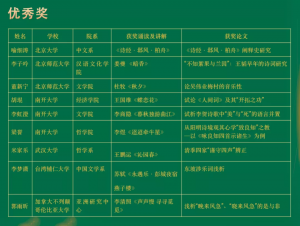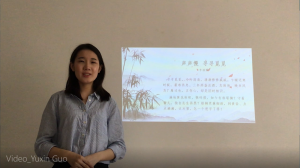Back home in Beijing last December 19, 2020, third-year UBC student Yuxin Guo received a pleasant surprise: she was one of 15 winners of the Excellence Award (优秀奖) for the Chia-ying Yeh and Minsheng Scholarship. Among the 15 winners, Yuxin is the only student who hails from a North American university. The scholarship was started in 2019 by UBC Professor Emerita Chia-ying Yeh, who is now founding Director of the Institute of Chinese Classical Culture at Nankai University, and aims to encourage curiosity in young talents for them to study traditional Chinese culture and Chinese classical poetry.

Yuxin’s name and work, listed as one of the winners of the Excellence Award for the Chia-ying Yeh and Minsheng Scholarship
Although a geography major, Yuxin decided to pick up Chinese courses in her second year of university, wanting to go back to the feeling of her high school Chinese literature courses. She decided to take CHIN 471, Later Classical Chinese Poetry in the Tang Dynasty, with Professor Xueshun Liu. Taking the class reminded her of home: her professor was passionate, the subject was familiar, and at the same time, a more fulfilling learning experience than in high school.
Yuxin’s interest in classical Chinese poetry started in high school, sparked by her literature teacher, who would often drop anecdotes about the poems and poets they were studying. Yuxin found herself paying closer attention because of these anecdotes, and was drawn to the way different poets chose to express themselves, the uniqueness of each phrase used in each poem. From that point, her interest deepened, causing her to pick up the subject again once she came to UBC.
“我觉得表达和意境是最吸引我的地方。它的表达是你再也找不出第二种替代方式的表达。可能某首诗或某首词其中的一个字,或者一个词,它意境中描写的一幅画面,我觉得这是最打动人的地方.” (I think what attracts me the most is its poetic expressions and its artistic conception. Its expressions are so unique that they are absolutely irreplaceable. A word, a phrase, a poetic scene conceived in a poetic line, all these could touch a reader deeply.) ”
Yuxin immediately found a major difference studying the subject at UBC. When she was in high school, she would only study one version of a poem. Comparatively, at university, her professor would bring up multiple perspectives and controversies surrounding a single poem, and encourage them to consider different perspectives and nuances, rather than guide them toward a single path. Though surprising at first, she came to realize how important it was to center discussion and debate around these differences in perspective. To Yuxin, learning this critical mindset was one of her most valuable lessons from this course.

“我觉得在这个过程中,批判心思,或者一种质疑的思维,质疑的精神,就是我觉得学到的非常大的一部分.“ (I think the most significant acquirements that I have got from the course is a critical thinking mindset, a challenging spirit, and a questioning attitude.)
It was this difference in perspective that inspired her application to the Chia-ying Yeh and Minsheng Scholarship. Unsure what to write about at first, she sought advice from Professor Liu, and following his advice, decided to follow her interests. Yuxin chose the poem “Note after Note, Long Song” (声声慢·寻寻觅觅) from her favourite poet, Li Qingzhao, drawn to the poem because of its poignance and precision in language.
Wanting to pinpoint an area that hadn’t been previously analyzed, she focused her discussion on a dispute in the wording of a single line. When she had learned this poem in China, it was with the line “the strength of the evening wind” (晚来风急), but many scholars have written the poem with the line “the strength of the morning wind” (晓来风急). The single difference in character — dusk (晚) or dawn (晓) — would change the meaning of the poem. It is this difference that became the focus of her thesis. Encouraged by Professor Liu, Yuxin decided to narrow the scope of her analysis, curious to see what conclusions she could draw from the text.
“As a student, Yuxin is highly intelligent and diligent. What is more impressive is that she is truly serious and enthusiastic about pursuing knowledge, strengthening her research skills and analytical abilities. She is the kind of person who values process more than results and thinks that making mistakes is an efficient way to make progress…When I recommended this scholarship contest in class, I was very glad that she decided to apply for it.”
At the time of her application, Yuxin had just completed her semester, as well as her two-week quarantine, upon returning home in the summer. It was during this time that she received an email from Professor Liu, informing his CHIN 473 students about this scholarship. As the summer weeks began, she decided to dedicate her time into her application. Her perseverance and dedication was evident: as one of the requirements was to submit a video explaining her thesis, Yuxin originally wanted to find a classroom to film in, with a whiteboard to help her explain her topic. Unable to find one due to Covid-19, she settled on using a film projector on her bedroom wall, using an iPad propped up on a table to film herself.
Yuxin commended Professor Liu for the support he provided throughout her application process, from helping her settle on a topic, to fine-tuning the details of her analysis, to her conclusion. From Professor Liu’s perspective, however, the success was all hers: “I did not help her much during the application process. I read her paper several times and gave her comments. After receiving my feedback, she did further research and made her arguments more solid. She won this scholarship because of her outstanding ability and hard work.”
It could not be more evident that Yuxin is deserving of this award, thanks to the support of Professor Liu and her CHIN 473 class, and most of all from her diligence, curiosity, and dedication. Her appreciation for not just the big picture, but the smallest details, of classical Chinese poetry rings true in her work.
“To win a scholarship is the recognition of one’s abilities, hard work, and contribution. It motivates you to work even harder—to acquire more knowledge and skills, to enhance your abilities, and to make more contributions,” notes Professor Liu. “This scholarship was established in honor of the splendid contributions to the field of classical Chinese poetry by Professor Emerita Chia-ying Yeh of this department. It means the world to students who are interested in classical Chinese poetry at UBC.”
For students such as Yuxin, the Chinese Language Program offers a cluster of courses that cover Chinese literature and culture, spanning from premodern to modern periods. Known as the CHIN 450+ courses, these courses enable students to examine various literary pieces in Chinese with a strong critical awareness, strengthen their academic writing, and further develop their interest through opportunities such as the Chia-ying Yeh and Minsheng Scholarship. Further information can be found both on the Chinese Language Program website and the UBC Academic Calendar.
English title and translation of “声声慢·寻寻觅觅“ from Egan, R., & Shields, A. (2019). The Works of Li Qingzhao. Berlin, Boston: De Gruyter Mouton.
2020年12月19日,UBC大三地理系的同学郭雨昕在“第二届中华传统文化民生奖学金评选会”中获得了“叶嘉莹民生奖学金优秀奖”。由北京民生中国书法公益基金会于2019年设立的叶嘉莹民生奖学金,旨在鼓励青年才俊研究中国古典诗词、传承优秀传统文化,以叶嘉莹先生的诗词人生与学术思想为典范,海内外弘扬中华诗教。在15名获奖者当中,雨昕同学是唯一一位北美大学的学生。她的获奖论文讨论了中国历史上著名女词人李清照的一首词。
“我觉得表达和意境是最吸引我的地方。它的表达是你再也找不出第二种替代方式的表达。可能某首诗或某首词其中的一个字,或者一个词,或者它意境中描写的一幅画面,我觉得这是最打动的地方.”
作为一名优秀的诗词爱好者,雨昕在高中时就对诗词有着浓厚的兴趣。因此,她在2019年冬季的第二学期选修了中文473—唐到清诗词赏析课,而这门课程也给了她很多新的灵感。在赏析诗词时,雨昕发现老师会给出很多不同版本的解析,鼓励学生结合原文与历史资料独自思考分析。这种教学方法锻炼了她的批判性思维和分析能力,让她受益匪浅。
“我觉得在这个过程中,批判心思,或者一种质疑的思维,质疑的精神,就是我觉得学到的非常大的一部分.“
在不列颠哥伦比亚大学亚洲系中文部提供的课程中,有一系列课程与中文473一样,致力于鼓励学生的独立思想和批判性思维。这些课程通常被称为“中文450以上课程”,内容涵盖古今各种文学及文化现象,通过激发学生对具体内容的学术探讨,进而提高文学欣赏维度及学术写作能力。
中文课程473的刘老师在发现她对诗词的浓厚兴趣和优秀的分析能力后,鼓励她参加诗词分析的比赛,并给予了许多帮助。比如雨昕在最开始十分苦恼选题的问题,她花了大量时间做搜索调查却找不到适合讨论的诗词。因此刘老师建议她根据自己的兴趣去做选题,找争议点。最后雨昕在刘老师的指导下选用了自己喜欢的女诗人李清照的《声声慢·寻寻觅觅》来做分析。
在刘老师的帮助下,雨昕对诗词分析又有了更深的理解,而且在论文写作的能力也得到了很大的提高。未来雨昕希望能够在中文项目中学习到更过关于诗词的知识。
Written by: Shih-wei Wang, Xinyi Wang
Chinese editor: Liudi Zhang
English editor: Stephanie Wang